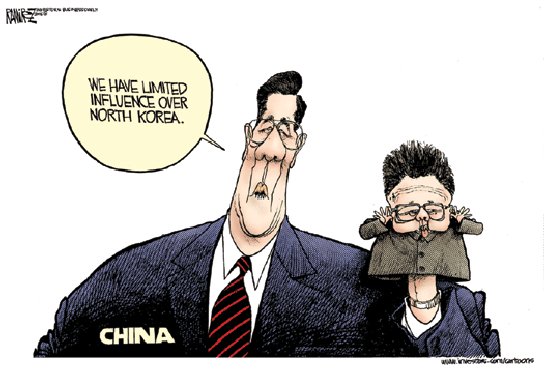
China ‘deeply committed’ to North Korea sanctions: US official
WASHINGTON
AFP
China has given its word to the United States that it is “deeply committed” to implementing tough new nuclear sanctions against North Korea, a senior US official said Friday.
The official also said that as part of the effort to put a straitjacket on Pyongyang after its latest nuclear test and missile launches, Washington had set up an inter-agency team to coordinate the sanctions with other nations.
“They are certainly saying quite strenuously that they are deeply committed to full implementation of the provisions that are in the resolution,” the senior administration official said, referring to China.
“The real test now will be in implementation,” the official said.
“We are going to obviously take their word seriously, but we’ll see in the end what they are prepared to do.”
Beijing is often criticized in the United States for its willingness to join, or carry out tough sanctions regimes against North Korea, particularly in congressional circles.
On Thursday, Republican Senator John McCain said that China had been “unhelpful, especially on the issue of North Korea.”
“I think it’s time we told the Chinese that an important part of our relationship is how they react as far as North Korea is concerned, but also as far as Iran is concerned,” the defeated 2008 presidential candidate said.
McCain dismissed “toothless” UN sanctions to curb North Korea’s alleged spread of weapons and nuclear know-how, pointing to news reports that a North Korean ship, potentially carrying arms, was headed for Myanmar.
Since it left the western North Korean port of Nampo on June 17, the Kang Nam 1 has been shadowed by a US Navy destroyer under UN sanctions on suspicion of carrying missiles or related parts.
South Korea’s YTN television news channel, citing an unnamed intelligence source, has said the 2,000-tonne ship was heading for Myanmar via Singapore.
The new team of US officials, under the leadership of former US ambassador to Bolivia Philip Goldberg, will head to China soon to engage a similar Chinese government team in Beijing, the official said.
The official also said that Washington believed that unlike previous sanctions regimes, the new set of punishments for Pyongyang could work in convincing it to change its strategy regarding its nuclear program.
“Now we have some very powerful tools, and the challenge is to make effective use of them,” the official said.
“It’s going to take time to actually have a bite, but we are trying to get out of the box very fast.”
Tensions on the Korean peninsula have been running high since Pyongyang carried out its second nuclear test last month.
After the underground test and subsequent missile launches, the Security Council adopted a UN resolution last week that includes financial sanctions designed to choke off revenue to the regime.
North Korea had already vowed to build more bombs and to start a new weapons programme based on uranium enrichment in response to the sanctions.

Wild Thing’s comment……
Obama and his people are so gullible, I guess they would believe anything a communist says.
The Chinese are challenging Obama, the NK’s are challenging Obama, the Islamist are challenging Obama, the Iranian government is challenging Obama, Hugo Chavez is challenging Obama, (even the American people are challenging Obama). When an enemy senses weakness, they will challenge. And all our enemies sense weakness.
 ….Thank you JohnE PFC U.S. Army for sending this to me.
….Thank you JohnE PFC U.S. Army for sending this to me.

The Chinese are going to play obama like a one string banjo. They hold lots of our dollars so they want the dollar to retain at least some value. At the same time they want cap and trade to pass so that lots more American jobs go to China while America is hobbled with environmental restrictions.
Anytime they want to China can take control of North Korea. Right now they can use NK as a chip on the poker table to keep America’s focus away from Chinese doings.
LMAO here Chrissie.
China is ‘deeply committed’ to North Korea’, not sanctions.
Following the end of the Russo-Japanese War, the Japanese declared Korea was their protectorate and expanded their control over local institutions despite Korean opposition. In August 1910, a treaty of Annexation was signed.
At the outset of WWII in 1938 Japanese troops took over in Korea. At the end of WWII and the Potsdam agreement , in December 1945 the USSR agreed to the 38th parallel being the demarcation between occupation zones in the Korean peninsula, partly to better their position in the negotiations with the Allies over eastern Europe.
It was agreed that the USSR would receive surrendering Japanese troops on the northern part of Korea; the U.S., on the southern side. It was agreed to by the US and the USSR, but not the Koreans, that Korea would govern itself independently after five years of international oversight.
However, both the U.S. and the USSR approved Korean-led governments in their respective halves, each of which were favorable to the occupying power’s political ideology.
South Korean President Syngman Rhee and North Korean General Secretary Kim Il-Sung were each intent on reuniting the peninsula under his own system. In the case of North Korea it was the Russian and Chinese Communist reunification.
Under the guise of a counter-attack, the North Korean Army struck in the pre-dawn hours of Sunday, June 25, 1950, crossing the 38th parallel behind a firestorm of artillery. The war was on!!!
On October 8, 1950, the day after American troops crossed the 38th parallel, Chairman Mao Zedong issued the order to assemble the Chinese People’s Volunteer Army. The Chinese made contact with American troops on November 1, 1950. Thousands of Chinese had attacked from the north, northwest, and west against scattered U.S. and South Korean (Republic of Korea or ROK) units moving deep into North Korea.
On July 27, 1953 an agreement between the Commander-in-Chief, United Nations Command, General Matthew B. Ridgway , on the one hand, and the Supreme Commander of the Korean People’s Army , Kim Il-sung and the Commander of the Chinese People’s volunteers, on the other hand, concerning a military armistice in Korea.
The main ceremony was a cold, 10-minute formality in Panmunjom by Lt. Gen. William K. Harrison, American representing the United Nations command, and Gen. Nam Il of North Korea, representing the Chinese and Korean Reds. Shortly afterward, Gen. Mark W. Clark, United Nations supreme commander, countersigned the 18 documents—nine copies for each side—and issued a warning statement to his forces. Clark said the armistice does “not mean an immediate or even early withdrawal” from Korea.
“It does mean that our duties and responsibilities during the critical period of the armistice are heightened and intensified rather than diminished,” he said.
“The conflict will not be over until the governments concerned have reached a firm political settlement.
NAM IL
General, Korea People’s Army
Senior Delegate,
Delegation of the Korean People’s Army
and the Chinese People’s Volunteers
WILLIAM K. HARRISON, JR.
Lieutenant General, United States Army
Senior Delegate,
United Nations Command Delegation
Congress has acknowledged this inherent executive power in both the War Powers Resolution, Pub. L. No. 93-148, 87 Stat. 555 (1973), codified at 50 U.S.C. §§ 1541-1548 (the “WPR”), and in the Joint Resolution passed by Congress on September 14, 2001, Pub. L. No. 107-40, 115 Stat. 224 (2001).
Now where is that declaration of war and the separation of powers between the legislative and executive branch where Congress declares the war and the president prosecutes it?
Both branches DELEGATE their responsibilities, while withholding authority, a condition that has killed thousands of Americans since WWII.
Appeasement works can’t you see?
Tom, your right, China is in the drivers
seat for sure.
Jack, LOL
That is great, thank you so much for the
information.